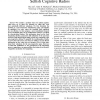Free Online Productivity Tools
i2Speak
i2Symbol
i2OCR
iTex2Img
iWeb2Print
iWeb2Shot
i2Type
iPdf2Split
iPdf2Merge
i2Bopomofo
i2Arabic
i2Style
i2Image
i2PDF
iLatex2Rtf
Sci2ools
108
Voted
GLOBECOM
2009
IEEE
2009
IEEE
Bargaining to Improve Channel Sharing between Selfish Cognitive Radios
We consider a problem where two selfish cognitive radio users try to share two channels on which they each have potentially different valuations. We first formulate the problem as a non-cooperative simultaneous game, and identify its equilibria. For cases where the resulting Nash equilibria are not efficient, we then propose a novel coordinated channel access mechanism that can be implemented with low overhead in a decentralized fashion. This mechanism, based on the Nash bargaining solution, guarantees full utilization of the spectrum resources while improving the utility of each user compared to the non-cooperative setting. We quantify the resulting gains. Finally, we prove that risk-averse users that are willing to accept offered information at face value have no incentive to lie to each other about their valuations for the non-cooperative game. However, we find that truthfulness is not guaranteed in the bargaining process, suggesting as an open problem the design of an incentive com...
Communications | GLOBECOM 2009 | Nash Bargaining Solution | Non-cooperative Simultaneous Game | Selfish Cognitive Radio |
Related Content
| Added | 16 Aug 2010 |
| Updated | 16 Aug 2010 |
| Type | Conference |
| Year | 2009 |
| Where | GLOBECOM |
| Authors | Hua Liu, Allen B. MacKenzie, Bhaskar Krishnamachari |
Comments (0)

